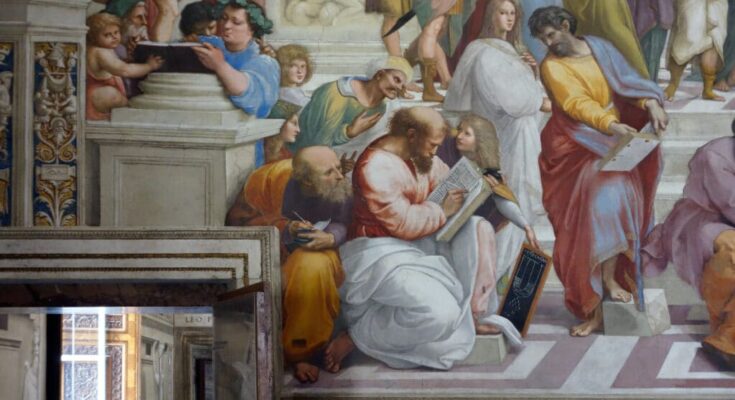
Damo is a relatively unknown figure of the ancient Greek world, who played a fundamental role when her father, Pythagoras, passed away.
There is not much historical information about her, but we do know that she lived around the 6th century BC in the Greek colony of Croton in modern-day southern Italy.
Damo was not just any woman. She was the daughter of a famous philosopher and mathematician, Pythagoras, who contributed to the world of science. Theano was Pythagoras’ wife. Of course, being the philosopher’s daughter was not an easy title to bear.
Ever since her birth, she was destined for a life full of intellectual adventures and pursuits. Many researchers believe Damo made important and groundbreaking contributions to broader Pythagorean thought and even, possibly, took over the leadership of the Pythagorean community following her father’s death.
Who was the ancient Greek philosopher Damo?
Understandably, Damo was born and raised according to the Pythagorean way of life. This relied on deep philosophical reflection with a more communal and ascetic lifestyle primarily aimed at purifying the soul and mind.
Pythagoras was a genuine believer in the importance and value of educating women alongside men. This belief led to the emergence of several female philosophers from his school, profoundly changing their lives.
Consequently, Damo likely received a rich and extensive education on par with the men in the community. She probably studied a wide variety of subjects, including philosophy, mathematics, and music, among others.
However, these are mere assumptions based on the few direct and indirect mentions of Damo in the works of others. As a truly capable philosopher in her own right, Damo must have contributed significantly to the development of Pythagorean ideas that profoundly influenced the ancient and modern worlds.
According to the 3rd century AD biographer Diogenes Laertius, Pythagoras himself entrusted his writings to his beloved daughter Damo even prior to his death. If this is true, it suggests he held his daughter’s abilities, intellect, and discretion in especially high regard. Damo is also said to have refused to sell the writings for her own financial interest, preferring a life of poverty over compromising her philosophical ideals.
Damo’s role in preserving Pythagoras’ work
While, unfortunately, the specifics of Damo’s own writings have not survived, there is a strong possibility that she may have edited and preserved some of the works of her father on mathematics and music theory, keeping them intact to the extent possible throughout the ages.
As a real insider in the somewhat secretive community of the Pythagoreans, Damo was well acquainted with their mystical and metaphysical speculations on the true nature of reality and the world.
She must have believed deeply in the Pythagorean conviction that stated that the universe, deep in its core, is fundamentally mathematical and that the soul is immortal. Her contributions to these particular philosophical discussions, while largely lost to history, were undoubtedly significant and influenced both her contemporaries and others later on.
We could argue that although not much is known about her life, one of the most emblematic achievements of Damo was her commitment to preserving her father’s writings rather than profiting from them.
This act of true philosophical virtue became a defining and crucial part of her life story that endured for centuries. By managing to preserve the work of Pythagoras for generations to come and potentially leading the community he established, Damo was the link that connected ancient Greek Pythagorianism to our modern times.



